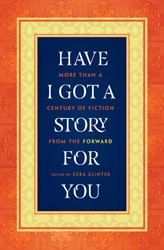Earlier this week, Ezra Glinter wrote about the research behind his anthology Have I Got a Story for You: More Than a Century of Fiction from The Forward, released this week from W. W. Norton & Company. Ezra is guest blogging for the Jewish Book Council all week as part of the Visiting Scribe series here on The ProsenPeople.
 In the course of researching Have I Got a Story for You: More Than a Century of Fiction from The Forward, I spent hours going through old microfilm, looking for the stories to include in the anthology. During that process I also came across countless items that were equally fascinating, but that fell outside the framework of the collection. Often these were non-fiction pieces, like news reports and travelogues written by some of the most renowned writers in Yiddish literary history. Below is a translation of one such item, a report by novelist Israel Joshua Singer on a May 17, 1934 rally of some 23,000 American Nazi supporters at Madison Square Garden.
In the course of researching Have I Got a Story for You: More Than a Century of Fiction from The Forward, I spent hours going through old microfilm, looking for the stories to include in the anthology. During that process I also came across countless items that were equally fascinating, but that fell outside the framework of the collection. Often these were non-fiction pieces, like news reports and travelogues written by some of the most renowned writers in Yiddish literary history. Below is a translation of one such item, a report by novelist Israel Joshua Singer on a May 17, 1934 rally of some 23,000 American Nazi supporters at Madison Square Garden.
The rally was held under the auspices of the DAWA, or the German-American Protective Alliance, an umbrella organization that had been founded with the express purpose of countering the Jewish boycott of Nazi Germany with a boycott of their own against American Jewish businesses. Both the mainstream and the Jewish press covered the event; the Jewish Telegraphic Agency deemed it “one of the strongest anti-Jewish attacks ever tolerated in this country.” The Forverts covered the rally with multiple front-page articles, including a first-person report by Singer, who had immigrated to the United the same year. Aside from the historical and cultural interest of the piece, Singer’s descriptions of the apologetic rhetoric used by the speakers at the rally, who defended themselves and their audience as true American patriots, rings eerily prescient against the backdrop of today’s political climate.

May 18, 1934Nazis Defame Jews at Madison Square Garden Rally; Call to Boycott, Defend Barbarians
I. J. Singer Describes the Nazi Rally at Madison Square GardenThe renowned author visits the rally and describes what happened there; Nazis at the meeting are like wild beasts with muzzles on their mouths; a lady Hitler supporter wants to sell him a “DAWA” sign; she curses him when he refuses to give her a dollar for the Nazi racket; impressions of the rally.
By I. J. Singer
Truth be told, people warned me not to go to the local Nazi gathering at Madison Square Garden. But my interest in seeing Hitler’s Germany in the middle of New York overcame any reluctance. I bought a ticket with a swastika on it and took myself to little Berlin in New York.
As soon as I entered I forgot that I was in New York; immediately I tumbled into a dark Nazi atmosphere. Hitler supporters in black pants, tall boots and white swastika armbands surrounded me on all sides. Women Nazis in brown outfits spread all kinds of merchandise in front of me: DAWA signs, flowers, Nazi literature.
“How much does a DAWA sign cost?” I asked a girl.
“One dollar,” she said.
I didn’t buy it, of course. The Nazi girl scolded me.
“Is that too much to support the German cause?” she asked.
The big hall was full. Only the top rows were unoccupied. Banners in German hung on all sides: “American Germandom Awake!” “Boycott the Boycotters!” Two pillars bearing German eagles and swastikas stood onstage. An orchestra played tedious, military music. Just then a group of Nazis carrying German flags and swastikas came on, together with several Americans. The music was some Hitler song. The chairman raised his arm high in the air, the way Hitler did. Everyone raised their arms and screamed: “Heil!”
After the whole Hitler-ish ceremony was over, speakers came on to play preacher. Who dared say that local Germans, the ones who had called today’s rally, were Nazis? A libel! A Nazi was a German national, and how could American citizens be German nationals? Therefore? They just wanted to prevent America from committing a crime. They loved America, they were America’s greatest patriots. They had to protest against those who wanted to destroy the friendly relations between America and the newly awakened Germany; they must defend themselves, protect themselves.
This message was aimed especially at America to show that they, the local DAWA folks, were the real patriots, while the Jews — all those Untermyers, Lipskys, Rabbi Wise’s and others — were no more than Communist agents of the Third International who wanted to bring down America and usher in Communism, both in America and in the rest of the world. This was the gist of every speech.
Along the way, of course, the speakers entertained the crowd a bit, sprinkling their talks with anti-Semitic barbs. Each time a speaker mentioned Untermyer, Lipsky, Wise and others, they made a point of drawing out the Jewish names for a bit of a Hitler-ish “joke.” This gave the crowd a great deal of pleasure. “Boo,” they jeered. “Tfoy!”
Great joy was had at the mention of some Jew named Ginzburg.
“Ha ha! Ginzburg!” the crowd delighted.
Wunderbar… Tara-loo…
It was simply astounding to listen, for several hours, to the long-winded arguments from the speakers. Not one of them would stop insisting that they were no Nazis, that they didn’t want to turn America toward German politics, that they were opposed to race hatred, that America is a free country and everyone has the right to live here, even Jews… So why did they fight so strongly for Hitler’s Germany and call for a boycott of American Jewry? On this subject they didn’t have a single rational word to say. They all told stories about how the Jews were hurting America, how the Jews were importing Communism, how the Jews wanted to bring ruin to German Americans, who comprised a quarter of the entire American population.
Also, only the Germans stood up for America and fought against the “Communism” of Untermyer and the rest of the Jews. They wore swastikas, sang the rowdy Host Wessel Song, screamed “heil” and founded the DAWA — all to save America.
It was just laughable to hear such arguments.
Aside from such “winning” arguments there was also a flood of primitive Nazi phrases and patriotic “lyrics,” in which real Germans have always been great experts.
What wasn’t heard at the rally? Germany would bring good fortune to the world, just as it had brought to itself. Hitler had brought fame and luster to the country. And the twenty-five million Germans in America, in whose veins flowed true German blood, were great idealists like Hitler, who said that “the individual is nothing and the people everything.” They shouldn’t believe the newspaper scribblers who said that Germany was barbaric. Germany was the resting place of their “fathers” and “mothers,” and how could such a land, where their “fathers” and “mothers” rested, be barbaric?
In response to such “logical” arguments the entire hall thundered with applause. So too real Germans expired from sentimentalism when the editor of the Deutscher Zeitung took to reckoning the righteousness of the German people, who had no equal in the world. While Jews, without exception, were storekeepers and careerists without a single ideal, the Germans, whether in Germany or elsewhere, were true idealists, worthy souls and saints, who believed only in what was best for the world. In a word, angels in tall boots.
In contrast, the Jews were just fat cats who got pleasure from paying twenty-five dollars to sit at a banquet with Einstein, the master of relativity. The Germans were pitiably poor, and therefore could only afford a single dollar for a DAWA sign.
At that point my neighbor, a blond German woman, began to weep copious tears at the speaker’s lyricism, which reminded me of the boring, sweet, patriotic songs they gave to German soldiers at the front in 1914 so that it would be sweeter for them to die for Kaiser and Fatherland…
I sat and listened to the tiresome falsehoods, saw the incitement of the crowd, and I understood Hitler’s power. With just those simple, foolish, purple phrases he seized hold of the small fry, of the patriotic housewives and beer-guzzlers. The engorged editor of the Deutscher Zeitung even managed to bring Moses into his “lyrical” sermon. Moses said that one must honor one’s father and mother; therefore they must honor Hitler’s Germany, where their fathers and mothers were laid to rest. Even if the whole world made a hue and cry about Germany’s murders, Germans must not take it to heart, because they must follow the instruction of the Ten Commandments and “Honor thy father and mother”…
More than at the “lyrical” speakers, however, I looked at the faces of the crowd. Their features were filled with hate, with beastly savagery, with murder.
Each time the Jews were mentioned, they screamed with a bestial bloodthirstiness. I once saw a wild animal that would have bit and chomped if not for a muzzle placed over her mouth. The speakers tried to present themselves as sheep, but the mob seemed like a wicked animal that roared with rage because of the muzzle it was forced to wear. The hall breathed with hatred, with medieval bloodthirstiness against anyone who was for integrity, justice and humanity.
We must keep this muzzled beast before our eyes, and fight to prevent it from escaping its muzzle. And the only way to do so is to boycott Nazi Germany.
With that conviction filling my body and soul I left the black Hitler nest for the free air of Broadway.
Ezra Glinter is The Forward’s critic-at-large. His writing has appeared in The New Republic, Paris Review Daily, Bookforum, and The Walrus. His biography of the Lubavitcher Rebbe is forthcoming from Yale University Press.
Related Content:
- The Brothers Ashkenazi by I. J. Singer
- Internal Dialogue: Writing Across the Linguae Francae of Midcentury Jewish America
- Kerri P. Steinberg: Jewish Mad Women
Ezra Glinter is a critic-at-large at the Forward. His writing has appeared in the New Republic, Paris Review Daily, Bookforum, and The Walrus. His biography of the Lubavitcher Rebbe is forthcoming from Yale University Press.


